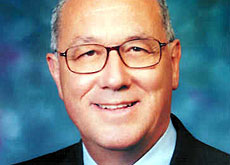
Diplomat heads delicate Swiss mission in Tehran

The new Swiss ambassador to Iran says one of his top priorities will be to continue the dialogue with Tehran on human rights.
In his first interview since taking up office in July, Philippe Welti told swissinfo about the challenge of leading one of Switzerland’s most high-profile diplomatic missions.
Welti officially presented his credentials to the Iranian president, Mohammad Khatami, at a ceremony in Tehran on August 2.
The start of his tenure comes at a sensitive time for Iran, which stands accused by the United States of developing a nuclear weapons programme.
Switzerland has the mandate to represent the interests of the US in Iran, and it is Welti’s task to facilitate dialogue between Washington and Tehran.
The Swiss diplomat said it was important that the Iranian government continues to work with the International Atomic Energy Agency (IAEA) “to prove” that it has no nuclear ambitions.
swissinfo: What can you say about how you fulfil your mandate to represent US interests in Iran?
Philippe Welti: Typically what happens is that I will get a message of a political or diplomatic nature from one side or the other and it is my job to pass this on.
Of course I don’t change the message at all, I just transmit it. The delicate thing is to preserve the confidentiality of whatever request or piece of information is being passed between Iran and the US.
On a more routine level, we are also responsible for looking after the interests of US citizens here and we have a special section dedicated to this within the Swiss embassy.
swissinfo: President Khatami said during your first meeting with him that he would like to boost economic, trade and scientific ties between Iran and Switzerland. How will you go about developing these ties?
P.W.: During my talks with the president and also with the foreign minister, Kamal Kharrazi, there was a clear understanding that economic ties were already quite dynamic. But what Iran wants is to expand these ties into direct Swiss investment in the country – and this is not the same as simply trading with each other.
I made it clear that decisions about whether to come [to Iran] are taken by private businesses in Switzerland, and that it is up to them to decide when and where they want to invest.
So my message was that if the country wants to attract investment, it is Iran that has to create the right conditions for this.
swissinfo: To what extent is Iran’s poor human rights record hindering investment in the country?
P.W.: I can’t speak for private enterprise, and so I don’t know how far they take this into account. But as I see it, what businesses deem to be important are things like legal investment protection and taxation laws which are adequate for foreign companies.
Of course the issue of human rights is relevant for firms looking to come to Iran, but my guess is that it is not at the top of the list of considerations business leaders have when deciding whether to invest.
swissinfo: A Swiss delegation was in Iran last October to launch a dialogue on human rights with Tehran. How far has this dialogue progressed since that visit?
P.W.: The first thing to say is that I mentioned to President Khatami that the promotion of human rights would be one of my priorities as ambassador.
In terms of the quality of our dialogue on human rights, we will just have to see how things develop.
As you mention, we have already held one round of talks here and the second round will probably take place early next year. So it’s too early to draw any conclusions about the effect of the Swiss-led dialogue.
What I can say is that the European Union has its own human rights dialogue with Iran, and this has already been successful in the sense that stonings have been suspended since these talks took place.
swissinfo: Aside from continuing discussion on human rights, what are your priorities as ambassador?
P.W.: My predecessor [Tim Guldimann] did an excellent job, particularly in the area of representing US interests in Iran. So my ambition is to be as good as him!
Another priority, as I mentioned, is to try and accelerate the expansion of economic ties by seeking to convince Swiss businesses to come and invest here.
swissinfo: Finally, we can’t discuss Iran without mentioning Washington’s fears that the country is developing a nuclear weapons programme. Does Switzerland share these concerns?
P.W.: My response would be very much in line with the Swiss position in general when it comes to the topic of arms control.
As far as the nuclear issue goes, the international community must try to keep Iran within the network of rights and obligations of the conventions which are applicable. And one important element is Iran’s membership of the IAEA.
Germany, France and Britain are currently in a dialogue with Iran to make the country understand that it has to disclose everything it is doing in the field of nuclear energy.
Iran has to prove that whatever it is doing is only to produce energy for civilian use, and has nothing to do with the possible production of nuclear arms.
swissinfo-interview: Ramsey Zarifeh
Philippe Welti was born in Zurich in 1949 and joined the diplomatic service in 1979.
In 1996 he was appointed Deputy Head of Mission at the Swiss embassy in Bonn, Germany.
He later headed the Directorate for Security Policy in Bern and frequently represented the Swiss defence minister at meetings of the Euro-Atlantic Partnership Council.

In compliance with the JTI standards
More: SWI swissinfo.ch certified by the Journalism Trust Initiative

























You can find an overview of ongoing debates with our journalists here . Please join us!
If you want to start a conversation about a topic raised in this article or want to report factual errors, email us at english@swissinfo.ch.